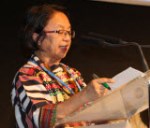Published on Fri, 2015-09-25 09:20
Indigenous women and girls experience complex, multi-dimensional and mutually reinforcing human rights violations, with abuses of their collective, economic, social and cultural, as well as civil and political rights being varied and severe. This is one of the main findings of the report of the Special Rapporteur on the rights of indigenous peoples, Ms Victoria Tauli-Corpuz, to the Human Rights Council, which is currently holding its regular thirtieth session. |
Published on Fri, 2015-09-25 08:54
Leaders of United Nation Member States are set to endorse the Post-2015 Sustainable Development Framework (now to be called the 2030 Agenda for Sustainable Development) at the General Assembly on 25-27 September 2015. Following what has been a long and at times arduous process to develop and agree this framework, throughout which the Trade Union movement has been actively engaged, the Post-2015 Summit in September will no doubt go down as an historic event. There are definitely grounds for celebration, not least simply because an agreement was actually reached, signalling a win for multilateralism on the whole, but also because it represents the culmination of one of the most inclusive efforts by governments to include the voices of civil societies and other non-state, non-executive actors in an international agreement. It would be fair to say that this is reflected in the level of ambition achieved in key parts of the outcome. Nevertheless, some reservations and concerns remain. |
Published on Fri, 2015-09-25 08:46
More than a hundred Heads of State and Government will gather in New York this week to adopt the 2030 Agenda for Sustainable Development. This agenda is intended to make the UN ‘fit for purpose’, but it is important to ask, ‘whose purpose will it be fit for’? A new study from Global Policy Forum warns that the United Nations is embarking on a new era of selective multilateralism, shaped by intergovernmental policy impasses and a growing reliance on corporate-led solutions to global problems. The changing funding patterns of the UN and its funds, programmes and specialized agencies reflect these alarming trends. Key features are the growing gap between the scale of global problems and the (financial) capacity of the UN to solve them; the growing share of non-core contributions and earmarked trust funds in UN finance; increased reliance on the corporate sector; and the outsourcing of funding and decision-making to exclusive global partnerships. |
Published on Fri, 2015-09-25 08:31
LDC Watch has released a statement addressing the Post-2015 Summit on 25-27 September 2015 in New York, which will adopt the post-2015 development agenda comprising a set of 17 sustainable development goals (SDGs) with a timeline until 2030. We have expressed grave concerns over the outcome document “Transforming Our World – the 2030 Agenda for Sustainable Development” especially about Means of Implementation and Global Partnership which is key to achieving the post-2015 development agenda. We have reiterated our campaign call 'NO SDGs without LDCs'! |
Published on Mon, 2015-09-14 09:24
"The UN must champion a process of truth and reconciliation" in development, said Barbara Adams, on behalf of Global Policy Forum and Social Watch during a round table at the United Nations in New York. Adams emphasised that "those who have benefitted the most from the past and current model are those that need to change the most". |
SUSCRIBE TO OUR NEWSLETTER







